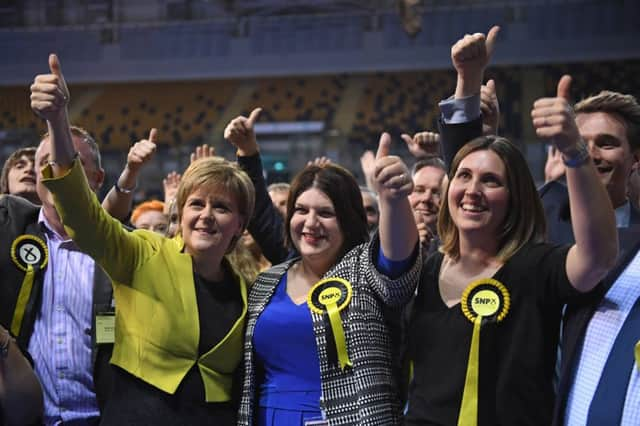Leader comment: Referendum could be only way to break paralsying grip of constitutional divide


We emerge, however, with that reality overshadowed by the surge of the Conservatives, who have doubled their tally of council seats and, most significantly, have positioned themselves as the main opposition to a second independence referendum.
The opinion polls indicated that this would happen, but no-one had predicted that the effect would extend into previous no-go areas for the Tories such as Ferguslie Park, Shettleston and Ravenscraig. These unlikely successes are confirmation that voting behaviour in Scotland is now dictated more than ever by the great constitutional divide.
Advertisement
Hide AdAdvertisement
Hide AdThis effect is a crying shame for local elections, and for the issues they are supposed to give the public’s verdict on. In their reaction to yesterday’s results, senior party figures made references to voters backing them because of their strength on local issues. These words ring hollow. Those voters who did mark their ballot paper with schools, roads, housing and the environment in mind were almost certainly in the minority.
So who actually “won” the election? The Tories have the most to celebrate, but the SNP are the face-value victors as the biggest party, with the most councillors by a long way. After ten years in government, by which time many administrations have reached their sell-by date, this is an impressive result for Nicola Sturgeon’s party. She can also point to the SNP becoming the largest party in 16 of Scotland’s 32 council areas – up from ten in 2012 – and joint largest in three others. In addition, her party now has the largest number of councillors in Scotland’s four largest cities.
However, the election leaves her with a lot to think about. Deeper analysis of the headline figures suggests that, when compared with the 2015 general election, the SNP vote has at best plateaued. The First Minister will also hear an alarm bell ringing in the east, where the SNP lost overall control of Dundee – a Yes city in the 2014 referendum – and Angus.
The opinion polls have suggested that there is no greater support for independence than there was in 2014 when Scotland voted for the status quo, and this latest barometer of opinion confirms that finding. If the SNP were hoping to attract more disaffected Labour voters, they might have found out yesterday that the well has run dry. Those Labour voters who have not defected to the Nationalists do not look likely to follow the others.
Scottish Labour deputy leader Alex Rowley responded to his party’s deeply disappointing results by stating that the outcome “only reaffirmed that if Scots want to stop the SNP, they have to vote Labour … on 8 June”. However, the evidence shows that Scots with that objective in mind are doing something entirely different, and backing the Tories.
And while the Jeremy Corbyn effect has contributed to Labour’s demise, the party’s Scottish leader, Kezia Dugdale, must take part of the blame for not taking a clear position on independence early enough, allowing Ruth Davidson to mop up the Unionist vote by positioning the Conservatives as the only party who can stop a second referendum.
Ms Davidson led a campaign which was unashamedly about stopping the SNP’s drive for a referendum rather than about local issues and she is certain to continue with this effective tactic in the run-up to the general election.
Because of the great divide effect we have witnessed this week, we can expect the general election to closely reflect these latest voting patterns – although with a different result because of the first-past-the-post system used at Westminster, which is likely to see the SNP emerge as clear winners in Scotland again.
Advertisement
Hide AdAdvertisement
Hide AdAnd where local issues were muscled out this week, the same will apply to Brexit on 8 June. The general election was called by a prime minister seeking a mandate for negotiations with the European Union, but the ballot in Scotland will not be about that, and will instead be about a second independence referendum.
What we face is the prospect of every future election in Scotland – council, Scottish, Westminster – being defined by the constitutional question. It is difficult to see how this will change without putting the matter to bed with a second referendum – the very scenario that those who have switched to the Conservatives do not want to happen.